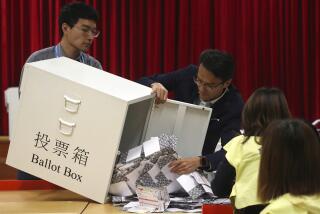Blustery Winds Over Hong Kong : China issues threats as Britain seeks to preserve the colony’s rights upon its return
With less than five years to go before Hong Kong is returned to Chinese sovereignty, British authorities are proposing democratic reforms so the colony will have a more representative government. That has angered the communist regime in Beijing, which last week started making some blustery threats.
Those threats raise questions of whether Beijing will cooperate in an orderly return of the territory as provided by the Chinese-British Joint Declaration of 1984. China promised in that agreement that it would not tamper with the political privileges enjoyed by Hong Kong residents and would allow the territory to govern itself for 50 years under the concept of “one country, two systems.”
But Britain has been stymied in its attempt to institutionalize democracy in Hong Kong by Beijing’s insistence that any British plans for the crown colony converge with China’s. Chinese authorities warned Hong Kong’s new governor, Chris Patten, during his four-day visit to Beijing last week of “confrontation” if British authorities proceed with proposed political initiatives.
Beijing threatened to reverse any democratic reforms it disapproves of when it assumes control of Hong Kong in 1997. It also said it would not accept any responsibilities, obligations, debts or agreements if Britain proceeds with the construction of a much needed airport.
The governor, an influential politician from Britain’s governing Conservative Party, earlier this month proposed revisions in Hong Kong’s electoral system so that residents would have a greater role in electing legislators. His proposals also would curb the influence of special-interest groups dominated by China.
Although Beijing maintains otherwise, the British proposals are widely perceived as being within the letter of the Basic Law, Hong Kong’s post-1997 constitution.
Indeed, Patten heeded Beijing’s earlier warnings on two fronts: He did not unilaterally act to enlarge the number of directly elected seats in the Legislature beyond those provided for by the Basic Law and he did not give in to demands of the United Democrats, who were victorious last year in the colony’s first elections, for seats on the Executive Council, the top decision-making body.
Beijing, of course, fears Hong Kong’s democratic ideas will spread to the mainland. But it needs the colony’s money and economic expertise. Hong Kong residents and investors rightly seek greater guarantees of freedom, come 1997. Patten has indicated that he will back down from the proposals only if residents of Hong Kong--not Beijing officials--reject them. That is a correct stance. A stable and secure Hong Kong is crucial to an orderly transition, and Beijing should not stand in the way.
More to Read
Sign up for Essential California
The most important California stories and recommendations in your inbox every morning.
You may occasionally receive promotional content from the Los Angeles Times.










